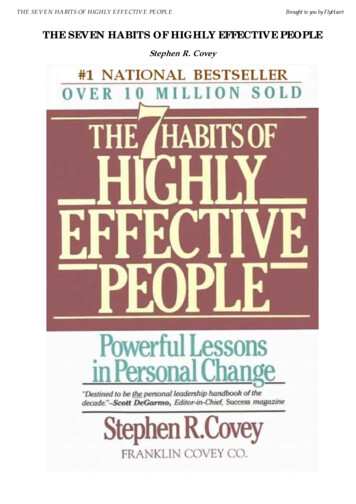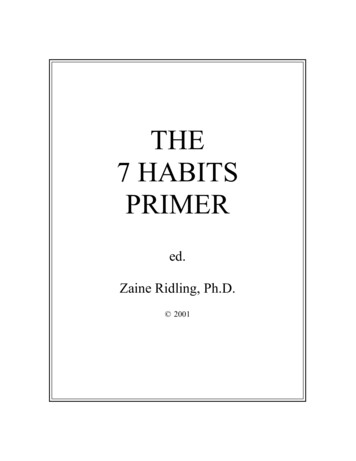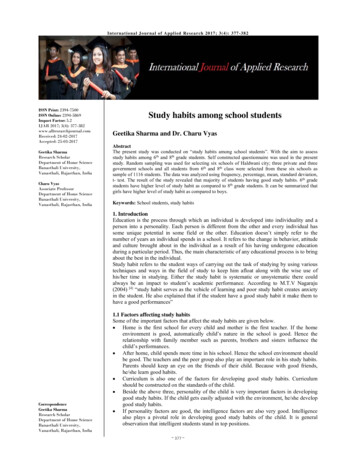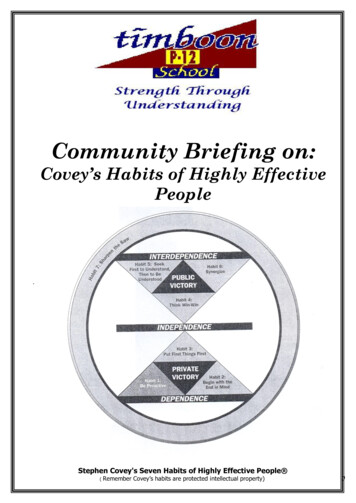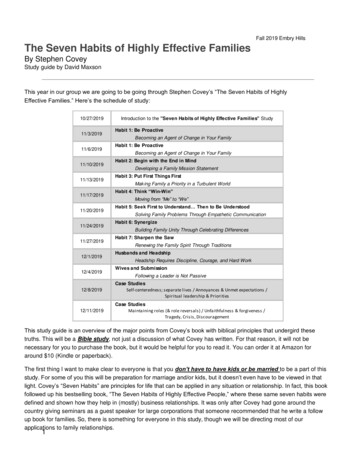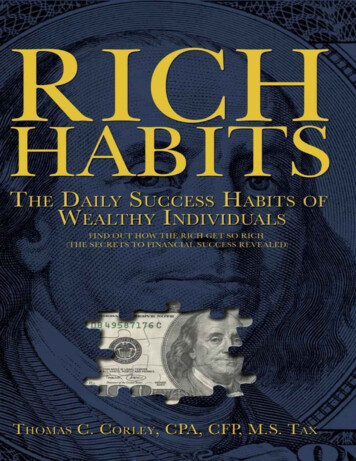
Transcription
RICHHABITSTHE DAILY SUCCESS HABITS OF WEALTHY INDIVIDUALSFind Out How the Rich Get so Rich (the Secrets to FinancialSuccess Revealed)Thomas Corley, CPA, CFP, M.S. Tax
Copyright 2009 by Thomas C. Corley.Langdon Street Press 322 1st Avenue North, Fifth Floor Minneapolis, MN 55401612.436.3954www.langdonstreetpress.comAll rights reserved. No part of this publication may be reproduced, stored in aretrieval system, or transmitted, in any form or by any means, electronic,mechanical, photocopying, recording, or otherwise, without the written priorpermission of the author.ISBN: 978-1-62652-746-1
Table of ContentsINTRODUCTIONThe Insurance SalesmanThe SecretaryThe Car DealerThe AccountantThe Rich Habits Training ProgramRich Habits at Work — The ClientRich Habits at Work — The SecretaryRich Habits at Work — The Car DealerRich Habits at Work — The Insurance SalesmanThe Commemoration of J.C. Jobs
INTRODUCTIONThe fact is: success is elusive. Why? Why are the rich so rich? Only about fivepercent of the population in the United States realizes true financial success.What traits do they possess that make them so successful? Few ever find out.Unfortunately, how to be financially successful in life is not a subject that istaught in our schools. We are all in the same boat, attempting through trial anderror to figure it out on our own.I have devoted years of researching the daily habits of wealthy people. I haveincorporated what I have learned from my research into the “Rich HabitsProgram,” which is designed to provide timely, easy-to-follow guidance onachieving unlimited personal and financial success. Wealth is not just abyproduct of random luck, education, hard work, or inheritance. Financialsuccess is a foolproof process. Within these pages is the twenty first centuryblueprint for financial success!I am a certified public accountant and certified financial planner to more thanone thousand individuals and small businesses. The genesis of this book beganwhen a struggling client came to my office seeking advice. The client’s businesswas growing; however, he had difficulty in making ends meet, particularly atpayroll time. In sheer desperation he asked, “What am I doing wrong?” Formonths I analyzed his business, his expenses, processes, labor rates, and industrycomparative data. I even sought advice from a “rich” client in the same industry,with a similar level of gross revenues and whose business shared comparabledemographics. Together we could find nothing that stood out, no glaringdeficiency.At a lunch meeting with my struggling client, some weeks later, I confessedthat I could not diagnose the cause of my client’s financial problems. The clientwas not happy. I was not happy. We sat in silence at our table for some time. Inan effort to break the uncomfortable silence I asked my client what he did whenhe came home at night. There was an immediate shift in my client’s demeanor.An almost impish look took hold and he asked me, “Which night?”“Pick your favorite night,” I suggested.The client told me that would be Wednesday.“What do you do on Wednesday nights?” I pressed the client.The client leaned in, eyeing the restaurant and said ever so quietly, “I get acouple of ladies of the night, a few bottles of wine and.” The client, in responseto my obvious look of shock, stopped mid-sentence. “I’m sorry,” he said. “Ishould not have shared that with you. I talk way too much sometimes.”
should not have shared that with you. I talk way too much sometimes.”I assured him that I was an Irish Catholic New York boy from a family ofeight and that there was very little I had not seen in my life. My shock was notfrom moral indignation, but from the realization that I had been asking my clientall the wrong questions these past months. The epiphany I had was that therewas much more to financial problems than meets the eye and that I needed to askthe right questions. I eventually came up with a twenty-question list that, over afive-year period, I asked to just about every rich or poor client I had, as well asevery business partner or person I knew.The data I gathered from these questions made me realize that there is adifference the size of the Grand Canyon in the way rich people and poor peoplelive their daily lives. This one client unknowingly took me down a path towardthe discovery of the secret to financial success.
The Insurance Salesman“I just can’t take it anymore,” Phoenix Upman murmured into his half-emptypint glass. He ran his short, plump fingers through what little hair was left on hishead as his cigarette burned out in the ashtray beside him.Bad day?” the bartender asked nonchalantly as he leaned over the bar,perusing the sports section. He didn’t seem particularly interested, but pretendedto be for his customer’s sake.Phoenix managed a sort of angry snort that gave way to forced, hollowlaughter. “ More like bad life.” He drained the rest of his beer and slid the emptymug forward for a refill. “Last night I had to tell my son that we could not affordto send him to college. we just don’t have the money. We can’t even swingtuition at Brookline.”Brookline, the local community college, gave discounted rates to countyresidents - practically giving away an education. The bartender sensedimmediately how pathetic Phoenix’s financial situation must be if he couldn’teven afford Brookline. The bartender had managed to get himself through twoyears there with what little davings he had, supplemented by the tips from thisplace.“Not even Brookline, huh?”“No,” Phoenix said. He lit up another cigarette and took a long, slow drag,letting his eyelids close as he held in his breath.“This one is on me.” The bartender set a fresh pint down in front of Phoenixand contemplated the troubled man. Although younger than the bartender, thatwas not obvious by looking at Phoenix. His receding hairline and expandingwaistline made him look older, as did the deep crease between his eyes and thewrinkles snaked across his forehead. Nothing about him was particularlydistinct. His shirtsleeves, rolled up to mid-forearm, had blotchy blue ink stains.“What do you do for a living?”“I sell insurance,” he said, too quickly perhaps. “What I mean is I try. What Imake is barely enough to live on, let alone put away for something like college.”Phoenix rolled a peanut between his thumb and forefinger, his gaze fixedsomewhere across the bar. He sat for a long while, quiet, slowly rolling thepeanut, unblinking. “How’d I get to be such a failure?” he murmured to himself.The bartender returned to the article he was reading. Phoenix set the peanutdown on the bar and wrapped his hand back around the cold glass, lifting themug to his lips once again, draining his latest pint. “You know, even if I diedthere's not much. I don’t even have enough insurance to make that worthwhile.”
there's not much. I don’t even have enough insurance to make that worthwhile.”He slid the glass forward, signaling another refill. “Some salesman I am,” hemuttered under his breath. He pinched the bridge of his nose and closed his eyestight, scrunching up his face.“You driving, man?” the bartender asked.“I’m not far from here, just a few blocks. I’ll be fine.”“I don’t know; you’ve been here a while.”Phoenix glanced at the bartender, a pleading look in his eyes. He knew hehad worn out his welcome, but how could he go home and face his son after lastnight? It was clear the bartender was going to cut him off. Sensing this, Phoenixlaid out some cash and pushed back from the bar. Without saying a word, heshrugged into his coat and cap, pulling his cap down tight on his head beforemaking his way down the length of the bar toward the exit.Outside was dark and Phoenix could see his breath hanging in the air beforehim. There were no stars; they were lost somewhere behind opaque Decemberclouds. He made his way over to his black subcompact and fumbled in hispockets for the keys. Inside the car was not much better; he could feel his fingersgoing numb from the cold. Phoenix lit one last cigarette and sat back, waiting forthe engine to warm up.He let his head roll back and sighed to himself something about bad luck.His eyelids fell shut as he took a long drag off the cigarette. The smoke swirledup and around his head in wispy grey ribbons before pooling in a thin cloud nearthe ceiling of the car. Phoenix opened his eyes and watched the trail of smokedance away from the butt. He shook his head slowly. He thought about what hemight say to his son, if the boy would even talk to him. A sudden knock on thedriver-side window startled Phoenix.“Jesus,” he muttered, fumbling around on the floor for the still-burningcigarette that fell from his hand with the knock on the window. He found thecigarette and snubbed what was left in the overflowing ashtray before rollingdown his window. “Can I help you?” he asked gruffly, staring up at the strangerwho had interrupted his thoughts.“I was just about to ask you the same thing.”“Excuse me?” Phoenix looked up at the stranger standing just outside thecar. “Do I know you?”“My name is Champ Dailey,” the stranger said, sticking out a gloved hand.Phoenix reluctantly obliged, loosely gripping the soft, black leather, and quicklyrecoiled.And your name is?” the stranger asked.“Phoenix Upman.”“Hi, Mr. Upman. I couldn’t help but overhear you back in the bar. I’m truly
“Hi, Mr. Upman. I couldn’t help but overhear you back in the bar. I’m trulysorry for your troubles.”Phoenix wasn’t quite sure what to make of this. When the bartender waspretending not to ignore Phoenix all he’d wanted was a little bit of sympathy, butnow, coming from this stranger, well, it just made him feel more pathetic.Phoenix waved off the comment, shaking his head, and fixed his gaze straightahead.“I’d like you to come by my office on Monday,” Champ continued. “I canhelp you.” Champ pulled a business card from his pocket and extended the card.Phoenix took the card and studied it suspiciously.“Help me? You don’t even know me.”“You’d be surprised,” Champ replied, a warm grin spreading across his face.“What are you like a loan shark or something? I’m not getting involved inthat, I got enough problems as it is,” Phoenix said.“No, Mr. Upman,” Champ loosed a slow rolling laugh and continued, “just aman looking in a very old mirror.” With that he turned to walk across theparking lot, calling over his shoulder, “Monday, twelve o’clock.”Phoenix’s eyes followed Champ in the rearview mirror, watching as he gotinto his car and pulled out of the lot. After Champ had gone, Phoenix foundhimself staring at his own reflection. “Old mirror?” he repeated to himself as hestudied his own face. He glanced down at the business card still in his hands.“Nothing to lose at this point, I suppose.” He tucked the business card in hiswallet and set off for home.Phoenix was restless as he showered and dressed for work on Mondaymorning. He could think only of the strange encounter and his upcomingmeeting with this Champ Dailey fellow. Phoenix had lost hope long ago, but onhis lunch hour that day, as he walked up Broad Street towards the address on thecard, his curiosity compelled him forward. As the numbers climbed, thebuildings became much nicer, taller, and more ornate. Finally, at the corner ofBroad and First, he came to a stop in front of the grandest building on the street.He grew dizzy as he looked straight up, taking in the façade of the building.Phoenix double-checked the address on the card to make sure he had the rightplace: 700 Broad Street. He sighed, futilely trying to count the number of floorsfrom the street.“May I help you?” the doorman said, interrupting his tally.“I have a meeting with Champ Dailey.”“Yes, sir,” the doorman replied, swinging open the tall glass door andwelcoming Phoenix inside. “Take the left bank of elevators, the ones markedtwenty to thirty-five. Mr. Dailey’s office is on the twenty-first floor. Exit theelevator to your right.”
elevator to your right.”Phoenix nodded, distracted by the lobby buzzing with energy. He found theright elevator and got in, his finger dancing over the button. He couldn’t help butwonder what he was getting himself into.The doors opened to an expansive reception area. Phoenix was immediatelyoverwhelmed. The room was larger than the entire sales department back at hisoffice. He hesitated before exiting the elevators, checking the floor number againjust to make sure he was in the right place.As he walked out of the elevator, Champ Dailey greeted him. “Mr. Upman,I’m so glad you came. Did you have much trouble finding the building?”“Um.uh, no,” Phoenix replied. “I hope, uh, this isn’t a bad time or anything.I can come back later if you’re busy. The place seems busy.”“No, I was expecting you, Mr. Upman. Please, follow me,” Champinstructed, leading him past the reception area and through a short hallway.Phoenix was stunned when Champ swung the door open to reveal an opulentoffice. The wood floors and oak-lined walls warmed the cavernous room, andnumerous paintings provided splashes of color. Phoenix took in the expansiveroom and conceded that this was the most impressive office he had ever been in.Phoenix took a better look at Champ. He seemed taller then Phoenixremembered, and lean with a full head of silver-grey hair. His soft, blue eyesradiated a kind of welcoming warmth, which put Phoenix at ease, at least a little.The man had a kind of good-natured air about him, and he seemed casual andrelaxed.“I’m so glad you came,” Champ said. He directed Phoenix to an empty chairin front of his desk.“I’m sorry about the other night. I guess.I, um, I was just, you know.”“No need to apologize,” Champ broke in, nodding sympathetically. Champsat, considering the man across from him for a moment. Phoenix shiftednervously in his chair as the silence settled between them. He couldn’t helpbeing distracted by his surroundings, peering around at the paintings andluxurious décor.“I’ve been where you are, you know.” Champ finally spoke, leaning in everso slightly. “I’ve been in the pits of darkness and despair.”Phoenix looked confused as his eyes settled back on the man seated acrossthe desk. “Despair? From the looks of things I’d say you are a continent fromdespair.”Champ paused, smirking just a bit. “I am, now; but not too long ago thingswere a mess. No hope, no direction, everything in life seemed to pass me by. Ialmost lost my family over my circumstances. I guess you could say I’ve come along way.” Champ closed his eyes and the smile faded from his face. “When I
long way.” Champ closed his eyes and the smile faded from his face. “When Iheard you the other night at the bar, it brought back a lot of painful memories.”Phoenix shifted again in his chair. He felt as though he were intruding on aprivate moment. Champ didn’t seem to notice Phoenix. Phoenix cleared histhroat, twice.“Funny thing that I was in that bar that night. I’d never been to that barbefore. After I left, I kept wondering why our paths had crossed that night. Whatput me in that particular bar on that particular night?” Champ seemed to driftagain. “The only conclusion I could reach was that something intended I bethere, meant me to be there, to meet you.”Phoenix stared at Champ, considering his words carefully. “Like what? Likefate, or something?”“Fate, yes.”“Why? What’s so important about me that fate would have us meet? Whyme?”A smile broke on Champ’s face and he sat up straight, his eyes wide as if hehad a long-kept secret he was ready to share. “I believe it was intended that Ipull you out of this hole you’re in. I am sure now that you are the veryopportunity I was told about. Yes, I am certain that you represent myopportunity to return the favor that I received a lifetime ago when I was analtogether different man.”“I don’t understand,” Phoenix replied.“You see, some years ago I was told that I might be called upon to helpanother in need. I was told I would know him when I saw him because I wouldsee the mirror image of my old self. I didn’t understand the meaning of this atthe time, but then you came along and finally it all made sense. Listening to youthe other night, I recognized immediately that you were the person I was meantto help.”“How did you know all this? How did you know to look for me?”“Because he told me to,” Champ said.“Who?”“My mentor, my advisor. In a lot of ways, the man who saved my life.”“Who?” Phoenix asked again.“J.C. Jobs.”Champ went on to explain how J.C. Jobs was responsible for Champ’s turnaround, and many others just like him.“He enabled us to reach levels of success we had never dreamed possible.”Phoenix listened intently, absorbing every word.“I was given ten laws by J.C. Jobs. He called them the ‘Rich Habits.’ I wastold to live these ten principles for thirty days and meet back with him. He
told to live these ten principles for thirty days and meet back with him. Hepromised me that if I followed these ten rules, my situation would improve. Atthat point, I had nothing to lose; so I did exactly as he instructed and met back upwith him after the thirty days had passed.” Champ paused and drew hisshoulders back.“And.?” Phoenix prompted.“And the rest is history. What you see all around you here is the byproduct ofliving the Rich Habits every day. The Rich Habits completely transformed mylife.”“And now you’re going to share these principles with me?” Phoenix asked, atrace of excitement on his face and in his voice.“No,” Champ replied. He leaned back in his chair and crossed his legs, eyesfocused squarely on Phoenix.“What? Then why am I here?” Phoenix furrowed his brow and his eyesbecame narrow. A creeping suspicion that Champ had been wasting his timenow took root, and Phoenix contemplated getting up right then and there andmarching out of the cavernous office without so much as a glance back. Stillsomething kept him anchored to his seat.“The principles are just an overview of a more comprehensive process. J.C.has created a program he calls the Rich Habits Training Program. He and histeam train individuals, such as you, in following the Rich Habits. Myresponsibility ends when I come across a candidate who meets J.C.’s mirrortest.” Champ reached across his expansive desk for a pen and scrawled a phonenumber on a sheet of paper.“Here is the number where you can reach J.C.’s office. Call this number firstthing tomorrow morning.”“And what do I say? How much does this training program cost?” Phoenixasked.“There is no cost when you are sponsored, Mr. Upman. Just let J.C.’s officeknow that Champ Dailey sponsored you. They can help you, Mr. Upman. Ofthat, I am certain.”With that, Champ stood, smoothing his jacket and directed Phoenix to thedoor. Phoenix was slow to get up, reluctant to leave, as he clung to the piece ofpaper withJ.C.’s phone number. He couldn’t help but think that the most valuable thingin the whole building was this simple scrap of paper now in his possession.The next morning Phoenix did as Champ instructed. As soon as he got towork he called the number. A woman answered.“Hello, my name is Phoenix Upman and I’m trying to reach J.C. Jobs.Champ Dailey told me to give him a call.”
Champ Dailey told me to give him a call.”“What may I tell Mr. Jobs this is in reference to?” the woman asked. “ChampDailey told me to say that I was sponsored by him.”“Certainly, Mr. Upman,” the woman replied. She took down Phoenix’scontact information and said she would relay the message to Mr. Jobs. Then shehung up the phone. Within a few minutes the same woman called Phoenix backwith an appointment for the next Rich Habits training session.
The Secretary“What am I going to do with her?” John Andrews, CEO of Sunblade, Inc., adistributor of saw blades in northern New Jersey, had just been informed by hisoffice manager Nina, that Dee had called in for the third time this month to sayshe was going to be late. The mornings were important for Sunblade, especiallyDee’s role, which required an hour each morning calling both existing customersand prospects. It was a process the company put in place years ago, and whenthe process was applied consistently, sales were the result. Dee’s absence meantno calls and lost sales for the week.“John, you keep bending the rules for Dee and she just keeps pushing theenvelope to see how much further you’ll bend them. I told you last year to fireher. Why don’t you just fire her already?” Nina had lost her patience for Dee’spoor attendance and sense of entitlement. Nina wanted Dee fired but John justcould not bring himself to do so.“But I see so much potential in her, Nina. If I could just break her of some ofthese bad habits she holds on to, she would shine. I just know it.”Dee Worthy worked as a secretary for Sunblade. Her pay for the past twoyears was meager, primarily due to her “bad habits,” as John began to call them.She was a young twenty-four-year-old, heavy set to the point of being unhealthy.She had a pleasant smile and an attractive face. Most of Dee's colleaguesdescribed her as a hardworking, conscientious, and a punctual employee. Thesesame people also described Dee as lazy, neglectful, and tardy. At times sheexhibited creativity, a great work ethic, and incredible promise, but eventuallyshe always fell back into tardiness, distraction, and indifference. The root cause,many suspected, were family issues from which Dee sought refuge in food. Hernear-obesity caused health issues, which manifested in frequent sick days.“A vicious circle of bad habits,” John admonished Dee at one of their manymeetings following a cycle of absences.In Dee's family circle she was the functional one. Her ability to earn even ameager income made her the family banker. John often tried to paint a picture ofher reality, how her family was dragging her down due to their own bad habitsand their seeming inability to draw a consistent income. Unfortunately, Deenever took John’s advice to heart. John recognized her vulnerability when itcame to her family. Recognizing this weakness, her family took full advantageof Dee. Dee's insecurities didn’t help matters, either. “I’m not that smart,” sheoften said to others around the office. “My cousin is the smart one in the family.She got the main course and all I got were the leftovers.”
She got the main course and all I got were the leftovers.”“Her cousin?” John barked at Nina. “The smart one with two children out ofwedlock – who lives with her and hasn’t had a job in over two years? Jeez.”“I need to talk to you about something personal.”John had grown so tired of these repetitious personal meetings with Dee,which were more and more frequent.“I got a second job as a bartender and I will need to leave early on Fridays.”John could tell from the look on Dee's face that she feared these meetings asmuch as John had grown tired of them. “How early Dee?” he asked in a clearlyfrustrated tone.“I need to leave at four p.m.”Work hours ended for everyone else at five-thirty p.m. John knew this wouldcreate a major problem for the other employees, who would resent seeing Johnas catering to Dee and bending the rules again, rules that didn’t seem to apply toDee. John feared that he would be sending the wrong message to everyone if hedidn’t exact some concessions from Dee.“I will agree to this on two conditions.”“Yes?” Dee replied sheepishly.“The first condition is that you will have to make up the missing time onThursdays.” Some members of the staff worked late on Thursdays, finalizingorders for the next week, so he felt her presence might thwart any staff assertionsthat Dee was getting special treatment.“The second condition is that if you fail to live up to condition number one,by the third time I will have no choice but to terminate your employment.”Dee, very reluctantly, agreed to the terms. What choice did she have really?She needed the extra money. Dee left his office and as the day wore on she grewresentful of her boss, thinking he was singling her out and being hard on her. Shefelt he should cut her a break. She had a lot on her plate. He was, she decided,wrong in forcing her to comply with their agreement.Notwithstanding, Dee obliged her boss and this new schedule for a time. Thestaff seemed to accept this arrangement and did not make waves for John.However, after some weeks went by, Dee began to steal a few minutes here andthere on Thursdays. Nina noticed this trend first and informed John.John confronted Dee on a Friday morning and said, “Strike one, Dee. Youleft early yesterday.”Dee was angry. She knew John was too busy to notice her early departuresand that Nina must have ratted her out. Dee reluctantly forced herself back to theregimen for a time, but subsequently fell back into her bad habits.“Strike two, Dee,” John advised her on another Friday following another
“Strike two, Dee,” John advised her on another Friday following anotherbreach of their agreement. The third strike did not take long, and on anotherFriday Dee found herself unemployed.Two weeks passed since she had been forced to vacate her apartment. Herfamily had abandoned her. No one even tried to reach out to Dee to see how shewas doing following the separation. Dee ran out of money, with not even enoughfor a meal. One night, succumbing to the hunger pains that were now all toofamiliar, she decided to visit St. Michael’s food kitchen for a hot meal. But asshe approached the food kitchen, she could not coax herself onto the line of poorpeople waiting outside. She walked around the block desperately trying to findthe courage and humility to join the line.Jan Goode had been watching Dee. He manned the outside line of thekitchen as a volunteer. His job was to help move the line along and direct thehungry into the facility for a hot meal. Jan began to notice Dee after her fourthtrip past the kitchen and he could see that she was distressed. Jan asked one ofthe volunteers to take his place momentarily and he walked over to Dee, whowas now sitting on the curb with her hands covering her face, sobbing.“Are you hungry?” Jan asked.“Excuse me?” she mumbled back.“I volunteer at the kitchen. I noticed you’ve been passing by for the past twohours. Why don’t you come in for some food?”“I can’t.” Dee drew her hands to her face and began to cry. “I can’t. I’m, I’mjust too humiliated.” Dee lost all control and her body shook with her sobs.Composing herself, she looked up at Jan. “I never thought I’d ever be in thissituation. I’ve done this to myself, you know. I made this all happen. I’m myown worst enemy. I blew a great job with a great boss in a great company.” Deelost her composure again and began to sob, then once again composed herself.“My boss tried to make me see things as they really were. I just didn’t listento him. I am such a failure in life.” Something she said or something about hersituation rattled Jan. It all sounded too familiar and brought back some oldmemories Jan had thought he had long ago erased. This upset Jan. He excusedhimself and walked back into the kitchen. He emerged a short time later with acontainer of food for Dee.“My name is Jan Goode. I understand what you are going through and Ithink I can help.” Jan handed Dee the container.“Help, me? Do you find people jobs or something?”“Not exactly.” Jan paused and repeated the words a stranger had spoken tohim so many years ago, “I’m just a man looking in a very old mirror. Come bythe kitchen tomorrow night after close.”
the kitchen tomorrow night after close.”Dee spent the night in the bed of a local shelter, pondering the words utteredby Jan. I’m just a man looking in a very old mirror. She wondered to herself,What did it mean? The words reverberated in her head until sleep arrived.Dee met with Jan the next night and Jan shared his own story. “A long timeago, I lost my job under circumstances similar to your own. I lost all hope. I wasrescued by a stranger who helped me turn my life around.”“How did he help you turn your life around?” Dee implored. Jan shifted inhis seat and took a deep breath.“This individual shared ten principles with me that changed my life forever. Iwent from unemployed to the CEO of the company that now employs me.Following these laws was not easy. He called them the Rich Habits. But followthem I did, and ten years ago the laws brought me to my current position in life.”“What are these Rich Habits?” Dee asked, in a more demanding, but sinceremanner.“That’s not how it works, Dee. You have to go through a training program.When you’re sponsored there's no cost. The program will teach you everythingyou need to know to turn your life around.” Jan reached into his pocket andpulled out a pen and paper and jotted a phone number down for Dee. “His nameis J.C. Jobs. Call his office in the morning. Tell them Jan Goode sponsored you.”Dee did as Jan advised and secured her place in line at the next session of theRich Habit Training Program.
The Car DealerHerb Riser was in a state of shock. He had just gotten off the phone with hisbanker and it seemed as if all hope of extending his dealership’s floor planfinancing had run out. The bank advised him that they were about to enforcetheir rights under the terms of Herb’s credit agreement and repossess hisinventory for a subsequent fire sale to limit the bank’s losses. For Herb, thismeant bankruptcy and financial ruin for his business and, worse, his family.Driving home that night, he felt so alone. At the light just outside his lot,Herb closed his eyes and let his head drop back. “How did I let this happen?”The words were muffled within the confines of his car. “How am I going to tellmy wife?”He couldn’t bear the thought of the anguish he was about to unleash upon hisfamily. They had young children, a large mortgage, and plenty of bills to pay.His employees were no better off with a host of financial obligations of theirown. Many of them had taken a chance on Herb, left good jobs to come andwork for him, and now this was how they would be repaid. From s
Rich Habits at Work — The Insurance Salesman The Commemoration of J.C. Jobs. INTRODUCTION The fact is: success is elusive. Why? Why are the rich so rich? Only about five percent of the population in the United States realizes true financial success. What traits do they
